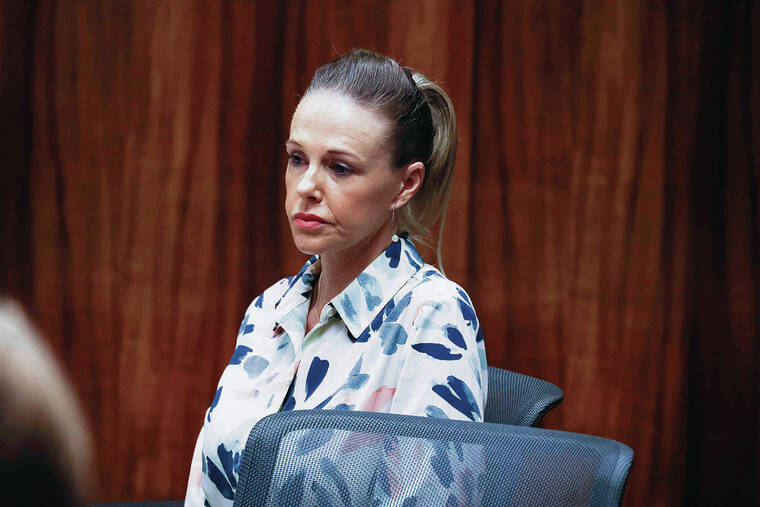The 35-year-old mother of 7-month-old Abigail Lobisch, who died in 2019 of an overdose of diphenhydramine — the drug found in Benadryl — gave tearful testimony Thursday about losing her “sweet baby.”
While the state asserts babysitter Dixie Denise Villa, on trial for manslaughter, is the only one who could have given the 7-month-old girl the drug, the defense tried to implicate Anna Lobisch’s breast milk as the source of the drug.
Court-appointed lawyer Megan Kau questioned Lobisch on whether she provided breast milk or had it in the bottle that Abigail had with her when she dropped off her daughter and 2-year-old son Feb. 23, 2019, at Villa’s hotel room at the Aulani Disney Resort &Spa.
Kau said Tylenol PM contains diphenhydramine, the same antihistamine found in Benadryl, and pressed her on the issue.
Lobisch said that on that day her daughter’s bag of supplies contained her usual formula of Similac in a purple can and that had given her a bottle of formula when she awoke and another for the car ride, with no other bottles in the bag.
Lobisch testified that she initially had provided breast milk in November 2018 for Abigail when her two children first started going to Villa’s Aliamanu Military Reservation home for day care.
But after a month or so, the supply “dried up,” and she provided formula after that.
In cross-examination, Kau asked Lobisch about text conversations with a friend, indicating she had concerns about taking Tylenol PM and it being in her breast milk.
Lobisch responded, “Yes.”
Kau showed messages from her friend, who told Lobisch prosecutors “could use it against you” and that “they could test the breast milk,” so to “keep the story straight about breast milk.”
Lobisch said she could not recall bringing breast milk to Villa in February 2019, only in November and December 2018, but did say she had an excess supply
of breast milk that she had stored in a freezer and sold.
However, the testimony of Dr. Jon Gates, forensic pathologist of the Honolulu Medical Examiner’s Office, who performed the autopsy on the
infant, eliminated the possibility of Tylenol PM as the source of the high level of diphenhydramine in Abigail’s blood.
Gates said the infant’s heart blood was sent to a Pennsylvania laboratory, which found no acetaminophen, the main ingredient
in Tylenol PM.
Gates found that Abigail died Feb. 24, 2019, at Villa’s home in Aliamanu Military Reservation.
Villa had arrived home with her two young children and the two Lobisch children after leaving Aulani sometime after 5:30 p.m. Feb. 23, 2019.
Villa’s daughter’s friend
Briana Calderon testified Wednesday that Villa argued with daughter Ariana Rivera at Aulani and told Rivera, her younger sister, Amaya Gordon, and Calderon to pack up and leave when they got back to Villa’s house.
Gordon went to the airport and caught a flight home to New York, while Rivera and Calderon stayed with a friend.
That left no one at Villa’s home that night, except for Villa and the four small children. Villa’s then-husband, a Navy sailor at the time, was deployed at the time.
Jurors saw photos of the body, which showed prominent signs of lividity on the front of the body — face, chest, legs, hands and forearms. Gates pointed out red discoloration, which he said occurs after death where the blood pools due to gravity.
He said it indicates she was likely lying facedown and was rolled over to her back between 30 minutes and 12 hours “during her death.”
The green discoloration on her abdomen is the first sign of decomposition, he said.
NMS Laboratories tested Abigail’s heart blood March 15, 2019, and found 2,400 nanograms per milliliter, or 2.4 milligrams per liter, of diphenhydramine.
He cited an article, “Fatal diphenhydramine intoxication in infants,” which looked at five cases.
Two died with 1.1 mg per
liter of diphenhydramine; one had 1.5 mg per liter.
He said, “It’s reasonable to conclude that 1.1 mg per liter is within the range of lethal concentration to infants.”
The deputy prosecutor said in her opening statement that Abigail had more than twice the lethal amount of the drug.
Her urine had greater than 5,000 nanograms per milliliter.
Gates said the presence in the urine means the body had begun to metabolize the drug, “indicating the diphenhydramine was higher before.”
Kaeo asked Gates whether he could say when she took the diphenhydramine, if it was possible she took it at 10:45 a.m., around the time she arrived at Villa’s hotel room.
He said symptoms
could appear within 15 to 30 minutes, including poor coordination, seizures, fever, an inability to control muscle movements, and can affect an infant’s ability to breathe.
The peak concentration would be around two hours after being administered, so sometime after noon, when the drug would have entered the blood, and increases for a time, then decreases after it metabollizes.
Gates said if the nose or mouth is covered, normally
a 7-month-old could protect the airway by rolling over or moving the head, but “given the inability to control muscle movements caused by diphenhydramine, the ability
to protect the airway would be compromised.”
“I can say with certainty that it wasn’t days ago” she was given the drug, he said. “Diphenhydramine is eliminated from the body within 24 to 48 hours.”
He said the facedown position did not have an effect on the cause of death.
He said there is no recognized lethal or safe amount for an infant and that the drug should not be given to infants under 2.
Honolulu police Detective Ryan Kaio testified Anna Lobisch was distraught and crying but coherent and able to answer all his questions.
He said Villa was “pretty calm” and showed “little emotion, that I was able to notice.”
He noticed the master bedroom was “extremely messy” with “clothes all over the floor.”
Villa participated in a re-creation of events using a doll to represent the infant and stuffed animals to represent the three others.
Jurors saw a photo that showed Villa lying next to the doll, which was how she depicted she had gone to sleep with Abigail cuddled against her, partially on her left side, Kaio said.
When Villa awoke, she said, Abigail was facedown on the bed.
Villa said she carried the infant downstairs to the living room and that she was red, unresponsive and cold to the touch.
There was no basis to believe a crime had occurred, no basis to search for medication until the autopsy report July 8, 2019, Kaio said. By then Villa no longer lived there.
Kau asked whether he investigated Lobisch, tested her breast milk or questioned her about medication.
“In July?” he asked. “No.”
Gates was asked about sudden infant death syndrome. He said it is an umbrella term for unexplained infant deaths but is not a cause of death.
Kau questioned Lobisch on how she slept with Abigail. Lobisch said her baby slept in a sidecar crib right next to her bed, but not in her bed.




